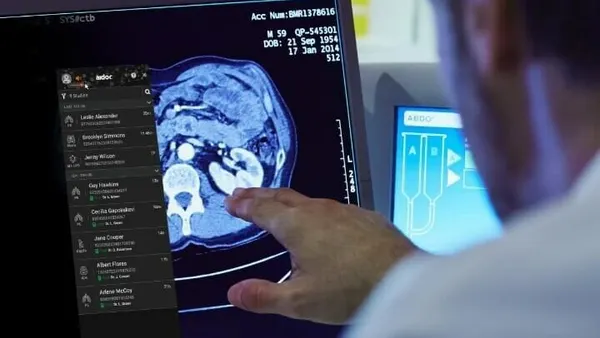Dive Brief:
- AliveCor received FDA 510(k) clearance to market its KardiaAI software analysis library intended to assess electrocardiogram rhythms, according to a document posted by FDA last week.
- The software supports analysis of data recorded in compatible formats from ambulatory EKG devices such as event recorders, the 510(k) summary said. The library is intended to be integrated into other device software.
- KardiaAI is not intended for use in life-supporting systems, EKG monitors, cardiac alarms or over-the-counter devices.
Dive Insight:
AliveCor's KardiaBand in 2017 became the first FDA-cleared medical device add-on for the Apple Watch. Kardia is the first artificial intelligence-enabled platform to help in the early detection of atrial fibrillation, the most common cardiac arrhythmia, according to the company.
KardiaBand is a predicate device for KardiaAI, an application program interface library that uses EKG processing and analysis algorithms to assess individuals' heart rhythms, FDA said. The secondary predicate is CardioLogs Technologies' EKG analysis platform. All three devices analyze EKGs for non-active patient monitoring or non-urgent clinical decision making, according to documents posted by FDA.
Clinical data has shown that wearable EKGs can detect heartbeat irregularities at a similar rate to traditional implantable loop recorders. The KardiaAI "software as a medical device" can provide EKG noise filtering, heart rate measurement from EKGs and detection of noisy EKGs, and can identify normal sinus rhythm, atrial fibrillation, bradycardia and tachycardia, according to the decision summary. The software computes physiologic parameters from a 30-second EKG.
AliveCor declined to comment on KardiaAI when asked about the 510(k) summary.
The summary shedding light on AliveCor's KardiaAI clearance follow FDA publicizing documents in late March that backed Apple's De Novo clearances in September for an electrocardiogram monitor embedded in its latest Apple Watch and for an application designed to detect irregular heart rhythms that may indicate atrial fibrillation.
Apple's EKG app for the Apple Watch is intended to create, display and transfer a single-channel EKG and determine the presence of atrial fibrillation or sinus rhythm. The company's Irregular Rhythm Notification Feature analyzes pulse rate data collected by an Apple Watch sensor to identify episodes of irregular heart rhythms consistent with atrial fibrillation and provides a notification to the user.
Johnson & Johnson is also getting into the business of early detection of atrial fibrillation through wearables in a collaboration with Apple. In January, J&J announced it would launch a multi-year, randomized controlled U.S. study later this year to investigate if a heart monitoring app it developed can speed diagnosis in people 65 and older who get notifications of an irregular rhythm from their Apple Watch.










